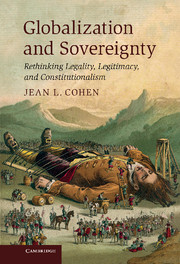Book contents
- Frontmatter
- Contents
- Preface
- Introduction
- 1 Sovereignty in the context of globalization: a constitutional pluralist approach
- 2 Constitutionalism and political form: rethinking federation
- 3 International human rights, sovereignty, and global governance: toward a new political conception
- 4 Sovereignty and human rights in “post-conflict” constitution-making: toward a jus post bellum for “interim occupations”
- 5 Security Council activism in the “war on terror”: legality and legitimacy reconsidered
- Conclusion
- Notes
- Bibliography
- Index
Conclusion
Published online by Cambridge University Press: 05 August 2012
- Frontmatter
- Contents
- Preface
- Introduction
- 1 Sovereignty in the context of globalization: a constitutional pluralist approach
- 2 Constitutionalism and political form: rethinking federation
- 3 International human rights, sovereignty, and global governance: toward a new political conception
- 4 Sovereignty and human rights in “post-conflict” constitution-making: toward a jus post bellum for “interim occupations”
- 5 Security Council activism in the “war on terror”: legality and legitimacy reconsidered
- Conclusion
- Notes
- Bibliography
- Index
Summary
The UNSC now engages in global governance tasks that go beyond its traditional functions including humanitarian interventions, the erection of highly transformative interim administrations of occupied territories, the imposition of sanctions directly targeting individuals (some of which violate their basic rights) in its pursuit of the “war on terror,” and the issuing of binding resolutions that are legislative and quasi-judicial in form. These practices are Janus-faced: while in some instances they prevent or help rectify humanitarian disasters and protect human rights, in others they lead to the evisceration of the rule of law and constitutionalism on all levels of the international political system, and undermine the foundational Charter principles of sovereign equality and human rights.
In response to the danger that a new form of hegemonic international law and new forms of hierarchical rule – con-dominium inside the UN Charter system, new imperial formations alongside it – are taking shape, I have argued for low-intensity constitutionalization as a way to steer the evolution of the universal GGI in the international political system in a normatively more attractive direction. The internal dualist structure of the UN as a constitutional treaty organization should be retained. But it must be reformed so as to bring it into line with the rule of law and to rectify some of its worst hierarchical features. Constitutional reform along the lines I have suggested would help ensure that the rules and decisions made by the SC, its key organ, and the actions it sponsors are rights-respecting. It would also create the possibility of a legal assessment of and response to ultra vires resolutions. Insofar as further constitutionalization would revitalize the principle of sovereign equality internal to the UN qua global governance institution, the latter would attain a greater degree of “democratic” legitimacy with respect to its right to rule in its designated domains because all states would have equal standing and a voice within the inclusive organization and all would be under its rules. This could, recursively, shore up sovereign equality in the international society of states, counteracting the spillover effects of hierarchy that now occur thanks to the newly expansive governance role of the UNSC.
- Type
- Chapter
- Information
- Globalization and SovereigntyRethinking Legality, Legitimacy, and Constitutionalism, pp. 320 - 326Publisher: Cambridge University PressPrint publication year: 2012



